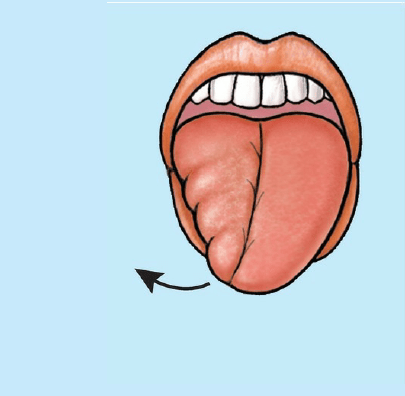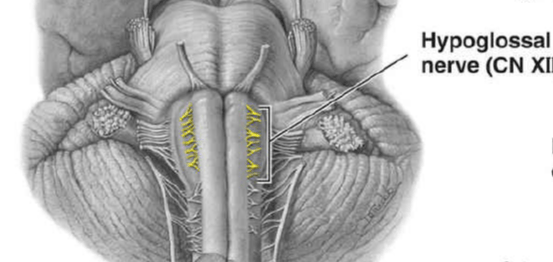Hypoglossal Nerve Injury
content of this page
1- Introduction
2- Anatomical Overview
3- Causes
4- Treatment
Introduction
Trauma, such as a fractured mandible, may injure the hypoglossal nerve (CNXII), resulting in paralysis and eventual atrophy of one side of the tongue. The tongue deviates to the paralyzed side during protrusion because of the action of the unaffected genioglossus muscle on the other side.

Anatomical Overview
The hypoglossal nerve, also known as cranial nerve XII, is a crucial nerve responsible for the movement of the tongue. It originates in the medulla oblongata of the brainstem and travels through the neck before branching out to innervate the muscles of the tongue. The hypoglossal nerve controls various tongue movements necessary for speech, swallowing, and chewing.
Injury to the hypoglossal nerve can occur due to various factors, including trauma, surgical complications, infections, or neurological conditions. Depending on the location and severity of the injury, symptoms can range from mild tongue weakness to complete paralysis of the tongue on one side.
Common signs of hypoglossal nerve injury include difficulty sticking out the tongue straight, tongue deviation to one side when extended, speech difficulties, and problems with swallowing or chewing. In cases of partial injury, the tongue may appear smaller on the affected side due to muscle atrophy.

Causes
Trauma: Direct trauma to the head, neck, or skull base, such as from motor vehicle accidents, falls, or sports injuries, can damage the hypoglossal nerve.
Surgical Complications: Procedures involving the neck, throat, or base of the skull may inadvertently damage the hypoglossal nerve.
Tumors: Both benign and malignant tumors in the head, neck, or brain can compress or infiltrate the hypoglossal nerve, leading to injury.
Infections: Inflammatory conditions such as meningitis or abscesses can affect the hypoglossal nerve.
Neurological Conditions: Diseases like multiple sclerosis or amyotrophic lateral sclerosis (ALS) can lead to nerve damage.
Idiopathic: In some cases, the cause of hypoglossal nerve injury is unknown.
Compression: Prolonged pressure on the nerve, such as from sleeping in an awkward position or using a dental device, can cause temporary nerve injury.
Birth Trauma: In infants, injury to the hypoglossal nerve during birth can occur, leading to tongue weakness or paralysis.
Treatment
Observation: In cases of mild injury or when the nerve damage is expected to improve on its own, regular monitoring may be recommended.
Physical Therapy: Exercises to strengthen the tongue muscles and improve coordination may help improve tongue function.
Speech Therapy: Therapy focused on improving speech and swallowing difficulties that may result from hypoglossal nerve injury.
Surgical Intervention: In cases where the nerve is severely damaged or compressed, surgical repair or nerve grafting may be necessary.
Medications: Pain medications or anti-inflammatory drugs may be prescribed to manage symptoms such as pain or inflammation.
Dietary Modifications: Adjustments to the diet, such as softer foods or liquid supplements, may be necessary if swallowing is affected.
Assistive Devices: Devices such as oral appliances or communication aids may help manage symptoms and improve quality of life.
Management of Underlying Conditions: Treatment of underlying conditions, such as infections or tumors, that are causing the nerve injury.